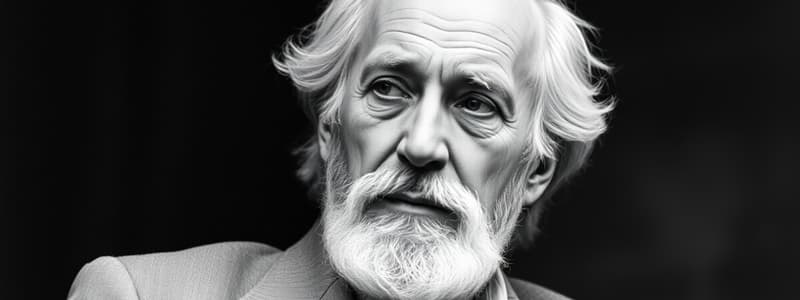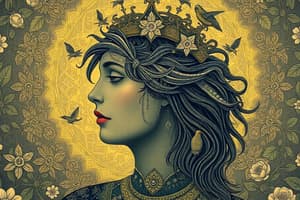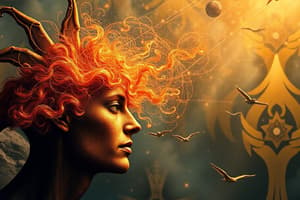Podcast
Questions and Answers
What does the ego represent in Jung's model of the psyche?
What does the ego represent in Jung's model of the psyche?
- The shared experiences across humanity
- The conscious mind and sense of identity (correct)
- The totality of the psyche
- The unconscious desires and fears
Which layer of the psyche contains repressed and forgotten material?
Which layer of the psyche contains repressed and forgotten material?
- Ego
- The Self
- Personal Unconscious (correct)
- Collective Unconscious
What is the significance of archetypes in Jung's theory?
What is the significance of archetypes in Jung's theory?
- They represent the roles played in society
- They are universal symbols shaping human experiences (correct)
- They serve as conscious memories
- They are unique to individual experiences
What does the persona represent in Jungian psychology?
What does the persona represent in Jungian psychology?
Which archetype is referred to as the central aspect of Jungian psychology?
Which archetype is referred to as the central aspect of Jungian psychology?
What does the process of individuation aim to achieve?
What does the process of individuation aim to achieve?
Which archetype in Jung's framework often symbolizes logic and authority?
Which archetype in Jung's framework often symbolizes logic and authority?
What is the collective unconscious defined as?
What is the collective unconscious defined as?
What aspect of his upbringing significantly influenced Jung's later theories?
What aspect of his upbringing significantly influenced Jung's later theories?
Which psychiatrist did Jung work with during the beginning of his career?
Which psychiatrist did Jung work with during the beginning of his career?
What was a significant reason for the deterioration of Jung's relationship with Freud?
What was a significant reason for the deterioration of Jung's relationship with Freud?
What major psychological concept did Jung develop after his break with Freud?
What major psychological concept did Jung develop after his break with Freud?
What did Jung explore during his personal crisis that contributed to his later theories?
What did Jung explore during his personal crisis that contributed to his later theories?
What kind of works did Jung publish in his later years?
What kind of works did Jung publish in his later years?
What was Jung's early academic focus before specializing in psychiatry?
What was Jung's early academic focus before specializing in psychiatry?
Which of the following areas did Jung incorporate into his psychological framework?
Which of the following areas did Jung incorporate into his psychological framework?
Flashcards are hidden until you start studying
Study Notes
Biography of Carl Jung
- Born on July 26, 1875, in Kesswil, Switzerland, to Paul and Emilie Jung.
- Childhood marked by maternal instability and introspection, influencing his interest in the unconscious mind.
- Fascination with nature led to solitary reflection; studied medicine at the University of Basel, later specializing in psychiatry.
- Began psychiatric career at Burghölzli Psychiatric Hospital in Zurich, researching schizophrenia and word association under Eugen Bleuler.
- Developed a strong intellectual partnership with Sigmund Freud, viewed as a potential successor.
- Theoretical disagreements in 1912 led to a deterioration in their relationship; Jung emphasized broader influences on the psyche beyond sexuality.
- Experienced a personal crisis post-Freud break (1913-1920), documented in The Red Book, developing theories like the collective unconscious and individuation.
- Became a key figure in modern psychology, exploring religious symbolism and alchemy until his death on June 6, 1961.
The Structure of the Psyche
- Jung's psychological model includes multiple layers:
- Ego: Conscious aspect responsible for individual identity and engagement with reality.
- Personal Unconscious: Contains accessible memories and experiences, including repressed material.
- Collective Unconscious: A fundamental concept, shared among all humans, housing universal experiences and archetypes.
Archetypes
- Archetypes are universal, symbolic images present in the collective unconscious influencing human experiences in various forms (myths, dreams, literature).
- Key archetypes include:
- The Persona: Represents societal roles and public masks.
- The Shadow: Encapsulates repressed desires and darker personality traits.
- The Anima/Animus: The feminine aspect (anima) in men and the masculine aspect (animus) in women; vital for psychological balance.
- The Self: Central archetype symbolizing the integration of conscious and unconscious, representing unity and balance in the individuation process.
Individuation
- Individuation: The transformative process of integrating various parts of the psyche for psychological wholeness and balance.
Studying That Suits You
Use AI to generate personalized quizzes and flashcards to suit your learning preferences.




